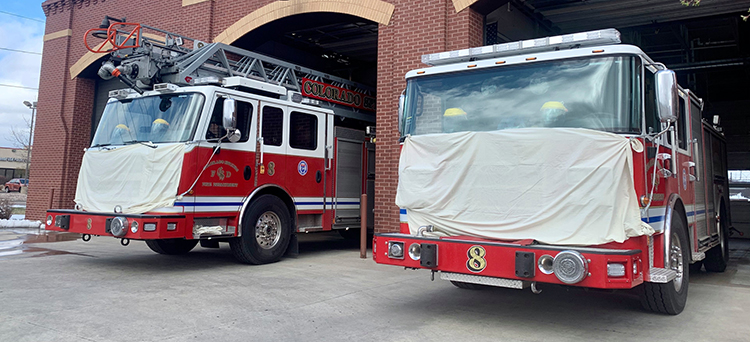
Aug. 31. By Dave Vieser. There’s been a 40 percent drop in the number of rescue calls handled by the Cornelius Lemley Fire Department.
It’s not that the populace is more healthy. Rather the department has been following a countywide procedure which has fire departments holding back on responding unless the call is very serious.
Historically, CLFD would roll an engine to rescue calls in order to get trained EMS personnel to the scene as soon as possible. But that all changed with the arrival of COVID-19.
“The medical director for Mecklenburg County and Medic advised all of the first responders in the county that they would be implementing a First Responder Exposure Mitigation Plan,” said Chief Guerry Barbee. It was put in place to preserve Personal Protective Equipment (PPE) and limit possible exposures to first responders.

Chief Guerry Barbee
County Medic dispatches calls in five different priority levels: Alpha, Bravo, Charlie, Delta and Echo, the latter two being the most severe).
“Currently we are not being dispatched to anything other than Delta and Echo responses, vehicle accidents and industrial accidents,” Barbee added. “If the Medic truck will have an extended response time the fire department is added to the call to respond as well.”
Cornelius-Lemley: By the numbers
April 2019 – 111
April 2020 – 73
May 2019 – 132
May 2020 – 60
June 2019 – 147
June 2020 – 78
July 2019 – 126
July 2020 – 94
Total 2019: 516
Total: 2020: 305
The only change which residents would notice are fewer sirens and fire department personnel at the scene of routine rescue calls. Serious rescue calls and fire calls have not been impacted by the policy change.
This has not just affected the CLFD. Barbee said that Meck Medic is also reporting a lower number of transports—answering the 911 call and transporting a patient to the hospital—during the pandemic.
Response times are down
Another side effect of the pandemic policy has been an improvement in response times.
Medic reports that in 2019 the average response time was 7 minutes, 48 seconds for priority one calls (life threatening), 8 minutes, 45 seconds for priority two calls and 11 minutes, 31 seconds for priority three calls (least severe). So far in 2020 the fire department’s average response times to medical incidents is 5 minutes, 17 seconds.
“This is a full two and a half minutes faster on priority one calls and a full six minutes faster to priority three calls,” Chief Barbee said.
No one knows where these statistics will head as the pandemic regulations are gradually lifted, but the numbers between April and now do show an interesting and unanticipated side effect of the COVID-19 crisis.
Now what does siren song mean?
The term “siren song” refers to an appeal that is hard to resist but that, if heeded, will lead to a bad conclusion.




